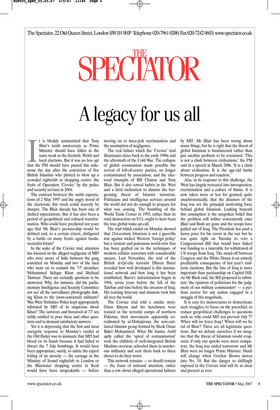A legacy for us all
It is bleakly symmetrical that Tony Blair’s tenth anniversary as Prime Minister should have fallen in the same week as the Scottish, Welsh and local elections. But it was no less apt that the PM should have passed this milestone the day after the conviction of five British Islamists who plotted to blow up a crowded nightclub or shopping centre: the fruits of Operation ‘Crevice’ by the police and security services in 2004.
The contrast between the sunlit expectations of 2 May 1997 and the angry mood of the electorate this week could scarcely be sharper. The Blair decade has been one of dashed expectations. But it has also been a period of geopolitical and cultural transformation. Who could have predicted ten years ago that Mr Blair’s premiership would be defined and, to a certain extent, disfigured by a battle on many fronts against fundamentalist Islam?
In the wake of the Crevice trial, attention has focused on the alleged negligence of MI5 who were aware of links between the gang convicted on Monday and two of the men who went on to commit the 7/7 atrocities: Mohammed Sidique Khan and Shehzad Tanweer. There are certainly questions to be answered. Why, for instance, did the parliamentary Intelligence and Security Committee not see all the surveillance photographs linking Khan to the (now-convicted) militants? Was West Yorkshire Police kept appropriately informed by MI5 of its suspicions about Khan? The survivors and bereaved of 7/7 are richly entitled to pose these and other questions and to demand satisfactory answers.
Yet it is depressing that the first and most energetic response to Monday’s verdict at the Old Bailey was to insinuate that MI5 had blood on its hands because it had failed to thwart the 7 July bombings. It would have been appropriate, surely, to salute the expert foiling of an atrocity — the carnage in the Ministry of Sound nightclub in London or the Bluewater shopping centre in Kent would have been unspeakable — before moving on to knee-jerk recrimination and the assumption of negligence.
The real failure which the ‘Crevice’ trial illuminates dates back to the early 1990s and the aftermath of the Cold War. The collapse of global communism made possible the revival of left-of-centre parties, no longer contaminated by association, and the electoral triumphs of Bill Clinton and Tony Blair. But it also sowed hubris in the West and a fatal inclination to dismiss the burgeoning threat of Islamist terrorism. Politicians and intelligence services around the world did not do enough to prepare for what was coming. The bombing of the World Trade Center in 1993, rather than its total destruction on 9/11, ought to have been the true global wake-up call.
The trial which ended on Monday showed that 21st-century Islamism is not a guerrilla war against wicked Western ‘foreign policy’ but a virulent and poisonous world-view that has been grafted on to the techniques of modern cellular terrorism with considerable success. Last November, the trial of the British al-Qa’eda terrorist Dhiren Barot revealed how well developed is this international network and how long it has been established. Barot’s indoctrination began in 1994, seven years before the fall of the Taleban and nine before the invasion of Iraq. His training itinerary and missions took him all over the world.
The Crevice trial told a similar story: Omar Khyam and his henchmen were trained in the terrorist camps of northern Pakistan, their movements apparently coordinated by al-Muhajiroun, the now-outlawed Islamist group formed by Sheik Omar Bakri Mohammed. What Mr Justice Astill aptly called the ‘spiral of contamination’ took the children of well-integrated British Muslims overseas, schooled them in murderous militancy and sent them back to these shores to do their worst.
This network remains — or should remain — the focus of national attention, rather than a row about alleged operational failures by MI5. Mr Blair has been wrong about many things, but he is right that the threat of global Islamism is fundamental rather than just another problem to be contained. ‘This is not a clash between civilisations,’ the PM said in a speech in March 2006. ‘It is a clash about civilisation. It is the age-old battle between progress and reaction.’ Alas, in its response to this challenge, the West has largely retreated into introspection, recrimination and a culture of blame. It is now taken more or less for granted, quite anachronistically, that the disasters of the Iraq war are the principal motivating force behind global Islamism. Lurking beneath this assumption is the unspoken belief that the problem will wither conveniently once Blair and Bush are gone and the troops have pulled out of Iraq. The President has paid a heavy price for his errors in the war but he was quite right on Tuesday to veto a Congressional Bill that would have linked war funding to a timetable for withdrawal of US troops from Iraq. The stand-off between Congress and the White House is an entirely predictable consequence of last year’s midterm elections. But the fate of Iraq is more important than partisanship on Capitol Hill. As Mr Bush said, the Bill proposed to substitute ‘the opinions of politicians for the judgment of our military commanders’ — a perilous course for any nation engaged in a struggle of this magnitude.
It is easy for democracies to domesticate such struggles, to focus on the parochial, to reduce geopolitical challenges to questions such as: why could MI5 not prevent July 7? When will we leave Iraq? When will we be rid of Blair? These are all legitimate questions. But we delude ourselves if we imagine that the threat of Islamism would evaporate if only our spooks were more competent, the Iraq war ended tomorrow and Mr Blair were no longer Prime Minister. Much will change when Gordon Brown moves into No. 10. But the danger so chillingly exposed in the Crevice trial will be as clear and present as ever.


































































































 Previous page
Previous page